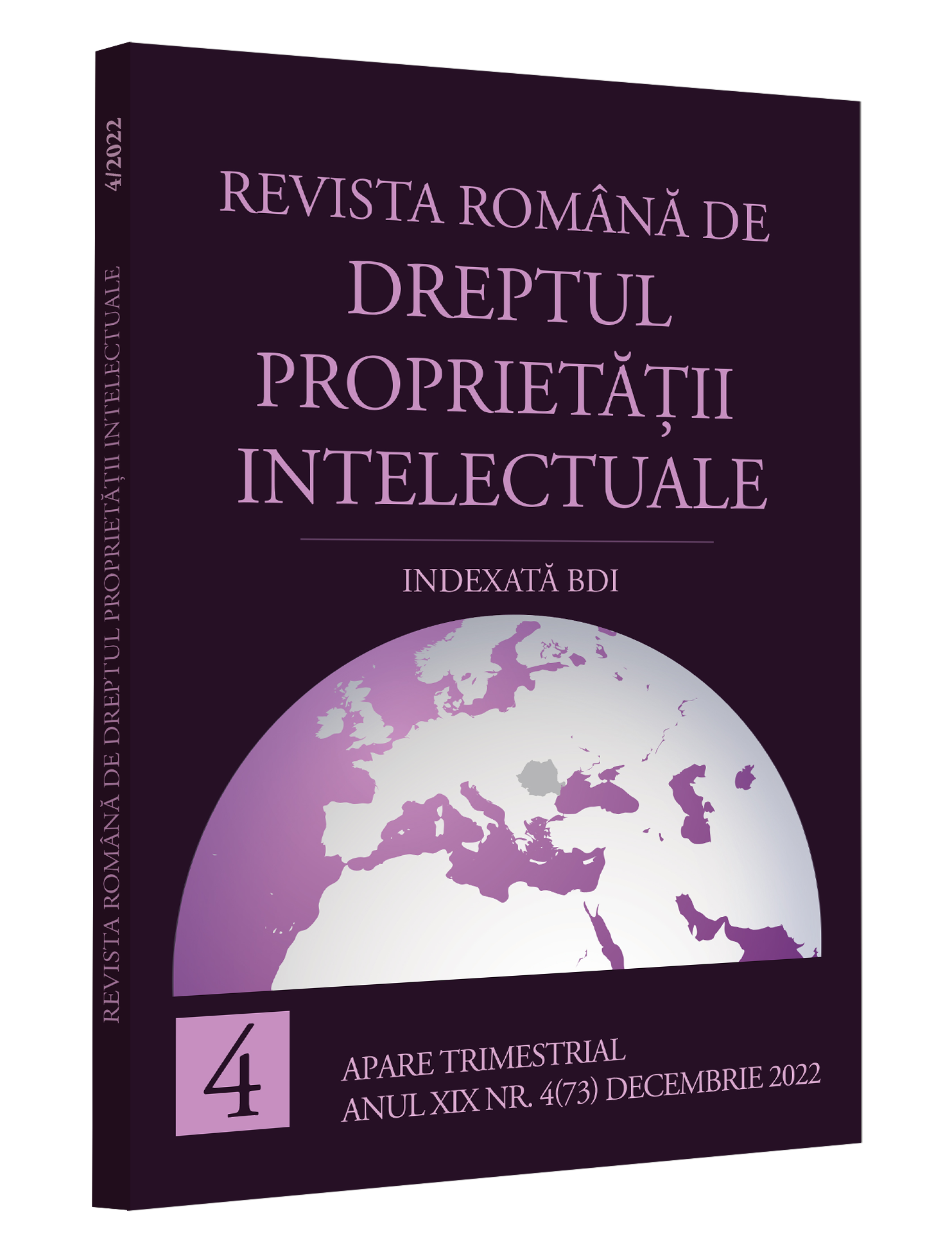Cele mai recente modificări aduse legii dreptului de autor și drepturilor conexe: norme europene vs. particularități naționale
The latest changes to copyright and related rights law: European rules vs. national particularities
Author(s): Ana-Maria MarinescuSubject(s): Law, Constitution, Jurisprudence, Civil Law, EU-Legislation, Comparative Law
Published by: Asociaţia Ştiinţifică de Dreptul Proprietăţii Intelectuale
Keywords: EU Directives 2019/789 and 2019/790; new definitions regulated; the completion of the disposition regarding the subject matter of copyright;
Summary/Abstract: Law no. 69/2022 regarding the amendment and completion of Law no. 8/1996 on copyright and related rights, republished, with changes and additions, was published in M. Of. no. 321 dated 1 April 2022 and entered into force on 4 April 2022. The main purpose of the draft law was on to implement into the national law the EU Directive 2019/789 of the European Parliament and of the Council of 17 April 2019 laying down rules on the exercise of copyright and related rights applicable to certain online transmissions of broadcasting organisations and retransmissions of television and radio programmes, and amending Council Directive 93/83/EEC1 (to be referred to from here on the Directive 2019/789) and of the EU Directive 2019/790 of the European Parliament and of the Council of 17 April 2019 on copyright and related rights in the Digital Single Market and amending Directives 96/9/EC and 2001/29/EC2 (to be referred to from here on the Directive 2019/790), ensuring in this way, according to the EU law, the legal security to the copyright and the related rights field, an enhanced degree of protection to rightsholders and providing guarantees to users for further development of their business in the creative sectors. Secondarily, the project to amend and supplement the Law no. 8/1996 aimed to remedy some problematic or non-compliant aspects of Union law and practice, for example the distribution of digital private copy remuneration among all categories of rights holders, including authors of written works and the inclusion of written works publishers as members of collective management organisations for the distribution and payment of private copy remuneration. The process of amending and supplementing the law lasted more than two years and was subject to numerous consultations and proposals from all the factors involved, sometimes also critics, being well past the deadline set for the implementation of the two previously mentioned directives, respectively 7 June 2021. The study considers the review and analysis of the main changes and additions brought by Law no. 69/2022, for example: the definitions provided for in art. 21; out of commerce works regulated in art. 91; differentiating between economical rights of cable retransmission, retransmission, public communication and making available to the public; the appropriate and proportional remuneration provided for in art. 401; the remuneration due from the actual use of the work provided for in art. 44 para. (11); publishers and press publishers; non-exclusive licenses for non-commercial purposes granted to cultural heritage conservation institutions for the reproduction, distribution, public communication or making available to the public of works or other protected objects that are out of commerce and present in the permanent collection of the institution, even if not all the rights holders covered by the license have mandated the collective management organisation according to art. 1284; rights of members in relation to collective management organisations; publicity measures regarding the possibility of granting licenses for works or other protected objects in accordance with art. 1284; patrimonial rights subject to mandatory, extended and optional collective management; obligations imposed on collective management organisations, including issuing tax invoices to users, which will be sent to users through the national RO e-Invoice electronic invoice system [art. 162 letter t)] or the limitation of penalties or of non-payment remunerations calculated exclusively with the application of legal interest; deadlines for implementing legal provisions etc. The conclusions of the study will highlight, among other things, the need to continue the legislative efforts in order to amend and supplement Law no. 8/1996, which still contains aspects that create numerous problems in practice and its republication, because the law has become an extremely difficult and technically material to follow and understand, including for specialists. At the same time, the study will highlight a way to improve the entire system of copyright and related rights in our country, namely the adoption of a law on collective management and collective management organisations, separate from Law no. 8/1996, taking the German model as an example, an aspect that would strengthen the position of collective management and collective management organisations.
Journal: Revista Română de Dreptul Proprietăţii Intelectuale
- Issue Year: 2022
- Issue No: 4
- Page Range: 64-96
- Page Count: 33
- Language: Romanian
- Content File-PDF

